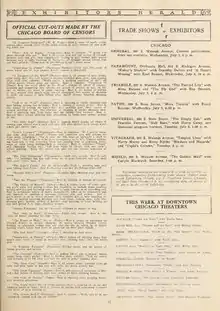
A list of cuts made to films by the Chicago Board of Censors. Published in the Exhibitors Herald in 1918
The Chicago Board of Censors was a film censorship committee based in Chicago that was founded in 1907[1][2] as the Police Censor Board, and operated until 1984.[3][4] It was the first film censorship board in the United States.[5][6] The board had great influence over the editing and distribution of many films.[7]
The city's censorship code was directly challenged and upheld by two U.S. Supreme Court cases called Times Film Corporation v. City of Chicago, one in 1957 and one in 1961. Soon thereafter, other Supreme Court decisions in the 1960s (especially Freedman v. Maryland in 1965) reversed this holding and rendered municipal censorship laws largely ineffectual.[2]
See also
References
- ↑ "New Book Traces History of Cinema's Censorship". WTTW News. Retrieved 2019-12-17.
- 1 2 "Film Censorship". www.encyclopedia.chicagohistory.org. Retrieved 2019-12-17.
- ↑ Rick Kogan (June 27, 2014). "Chicago's film censorship era on display".
- ↑ Benzkofer, Stephan. "When a Chicago police censor ruled over films with an iron fist". chicagotribune.com. Retrieved 2019-12-17.
- ↑ Staff, NCAC. "A Brief History of Film Censorship". National Coalition Against Censorship. Retrieved 2019-12-17.
- ↑ "Film Censorship / Noteworthy Moments in History". www.aclu.org. Retrieved 2019-12-17.
- ↑ Doherty, Thomas; Doherty, Thomas Patrick (February 2009). Hollywood's Censor: Joseph I. Breen and the Production Code Administration. Columbia University Press. ISBN 978-0-231-14359-2.
This article is issued from Wikipedia. The text is licensed under Creative Commons - Attribution - Sharealike. Additional terms may apply for the media files.